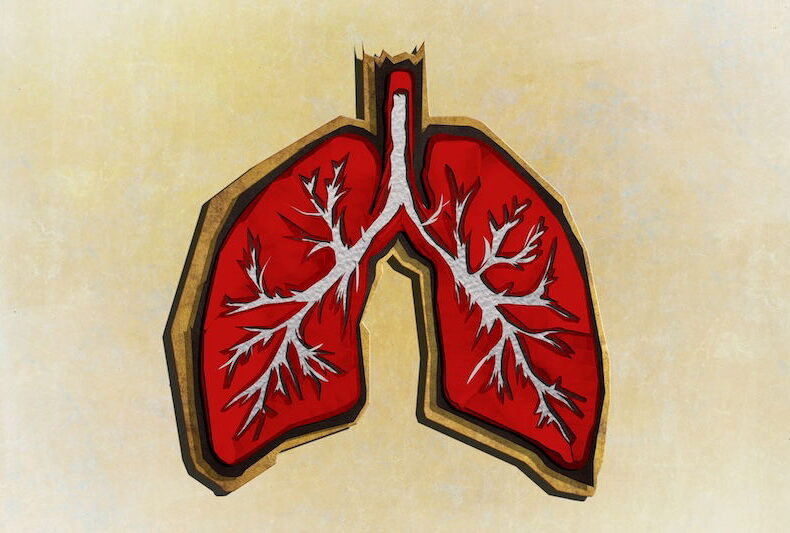
New study reverses chemotherapy resistance in lung cancer
A major breakthrough in cancer research has shown that using CRISPR gene editing technology to turn off a specific gene can help fight chemotherapy resistance in lung cancer. This discovery could open the door to new treatments that make current cancer drugs work better. The study was led by scientists at ChristianaCare’s Gene Editing Institute and was published in the journal Molecular Therapy Oncology. The researchers focused on a gene called NRF2. This gene usually helps protect healthy cells from stress. But in cancer cells, it can become overactive, helping tumors survive chemotherapy. By using CRISPR to switch off NRF2, scientists were able to make lung cancer cells sensitive to chemotherapy again. Dr. Kelly Banas, the lead author of the study, said the evidence was strong throughout the research process. They tested their approach in lab-grown human lung cancer cells and in mice, and both showed similar results. This gives researchers confidence to move forward toward human clinical trials. The study focused on lung squamous cell carcinoma, a common and aggressive form of non-small cell lung cancer. It makes up about 20 to 30 percent of all lung cancer cases. In 2025, more than 190, 000 people in the U. S. are expected to be diagnosed with this disease. While this research focused on lung cancer, it could help treat other types of cancer too. The NRF2 gene is known to play a role in chemotherapy resistance in several other cancers, including liver, esophageal, and head and neck cancers. By editing out the NRF2 gene in cancer cells using CRISPR/Cas9, the researchers were able to slow tumor growth and make the cells respond better to chemotherapy drugs like carboplatin and paclitaxel. Dr. Eric Kmiec, senior author of the study, explained that instead of inventing new drugs, they are making old ones work again by removing the cancer’s defenses. The team focused on a specific mutation in the NRF2 gene, known as R34G, that is often found in tumors. They used CRISPR/Cas9 to directly target and remove this mutation from the cancer cells. The results were impressive. Even when only 20% to 40% of the tumor cells had the gene turned off, the tumors became more responsive to treatment and shrank. The scientists also used lipid nanoparticles (LNPs) to deliver the CRISPR gene-editing tools. This is a safe and efficient method that avoids the risks associated with viruses. Tests confirmed that the editing was accurate and only affected the targeted NRF2 gene, with very few mistakes elsewhere in the DNA. Dr. Banas called the therapy “like an arrow that hits only the bullseye,” referring to how precise and effective the treatment is. Because of its accuracy and low risk of side effects, this method gives new hope to people battling resistant cancers. In summary, this research shows that gene editing could be used to make chemotherapy effective again for patients whose tumors no longer respond to treatment. It’s a major step forward in using CRISPR not just to treat inherited diseases, but also to improve outcomes for people with cancer. If you care about cancer, please read studies that low-carb diet could increase overall cancer risk, and new way to increase the longevity of cancer survivors. For more health information, please see recent studies about how to fight cancer with these anti-cancer superfoods, and results showing daily vitamin D3 supplementation may reduce cancer death risk.
https://knowridge.com/2025/11/new-study-reverses-chemotherapy-resistance-in-lung-cancer/
You may also like
参考资料
You may be interested
Globe bets on prepaid fiber, sets expansion
No content was provided to convert. Please provide the text...
Bragging rights up as Samal makes 5150 debut
A stellar Open division field will be shooting for the...
DigiPlus launches P1-M surety bond program
MANILA, Philippines — DigiPlus Interactive Corp. has partnered with Philippine...
 The New York Times
The New York Times
- Trump Administration, in Reversal, Tries to Continue Fight Against Law Firms 2026 年 3 月 3 日 Michael S. Schmidt, Jonah E. Bromwich and Devlin Barrett
- You Break It, You Own It? Not for Trump When It Comes to Iran 2026 年 3 月 3 日 Anton Troianovski
- Big Lenders’ Risky Loans Are Rattling Wall Street 2026 年 3 月 3 日 Rob Copeland and Maureen Farrell
- Trump’s Head-on-a-Pike Foreign Policy 2026 年 3 月 3 日 Ezra Klein and Jack McCordick
- As Trump Bashes Spain on Military Spending, German Chancellor Merz Piles On 2026 年 3 月 3 日 Jim Tankersley
- Labor Secretary’s Top Aides Forced Out 2026 年 3 月 3 日 Rebecca Davis O’Brien
- Apalachee High School Shooting: Colin Gray Found Guilty of Murder 2026 年 3 月 3 日 Rick Rojas and Johnny Kauffman
- Trump Immigration Sweeps Spawn Underground Safe Houses 2026 年 3 月 3 日 Miriam Jordan and Maddie McGarvey
- DHS Investigates Gregory Bovino’s Remarks About Prosecutor’s Jewish Faith 2026 年 3 月 3 日 Ernesto Londoño and Hamed Aleaziz
- Judge Vacates Punishments of Columbia Students Who Occupied a Building 2026 年 3 月 3 日 Sharon Otterman



Leave a Reply